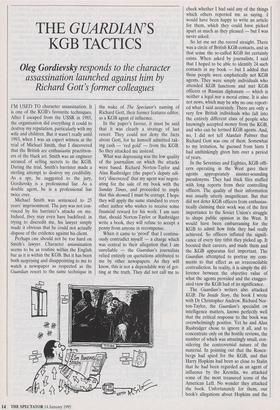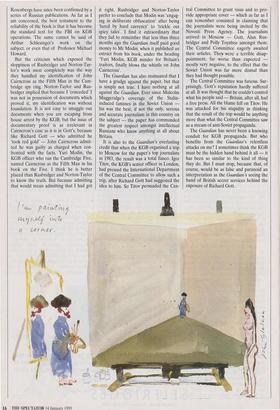THE GUARDIAN'S KGB TACTICS
Oleg Gordievsky responds to the character
assassination launched against him by Richard Gott's former colleagues
I'M USED TO character assassination. It is one of the KGB's favourite techniques. After I escaped from the USSR in 1985, the organisation did everything it could to destroy my reputation, particularly with my wife and children. But it wasn't really until 1993, when I was an expert witness at the trial of Michael Smith, that I discovered that the British are enthusiastic practition- ers of the black art. Smith was an engineer accused of selling secrets to the KGB. During the trial, Smith's barrister made a sterling attempt to destroy my credibility. As a spy, he suggested to the jury, Gordievsky is a professional liar. As a double agent, he is a professional liar twice over.
Michael Smith was sentenced to 25 years' imprisonment. The jury was not con- vinced by his barrister's attacks on me. Indeed, they may even have backfired: in trying to discredit me, his lawyer simply made it obvious that he could not actually dispose of the evidence against his client.
Perhaps one should not be too hard on Smith's lawyer. Character assassination seems to be as routine within the English bar as it is within the KGB. But it has been both surprising and disappointing to me to watch a newspaper as respected as the Guardian resort to the same technique in the wake of The Spectator's naming of Richard Gott, their former features editor, as a KGB agent of influence.
In the paper's favour, it must be said that it was clearly a strategy of last resort. They could not deny the facts about Gott, for he himself admitted tak- ing cash — 'red gold' — from the KGB. So they attacked me instead.
What was depressing was the low quality of the journalism on which the attacks were based. Richard Norton-Taylor and Alan Rusbridger (the paper's deputy edi- tor) 'discovered' that my agent was negoti- ating for the sale of my book with the Sunday Times, and proceeded to imply that this showed I must be corrupt. I hope they will apply the same standard to every other author who wishes to receive some financial reward for his work. I am sure that, should Norton-Taylor or Rusbridger write a book, they will refuse to accept a penny from anyone in recompense.
When it came to 'proof that I continu- ously contradict myself — a charge which was central to their allegation that I am unreliable — the Guardian's journalists relied entirely on quotations attributed to me by other newspapers. As they will know, this is not a dependable way of get- ting at the truth. They did not call me to
check whether I had said any of the things which others reported me as saying. I would have been happy to write an article for them, which they could have picked apart as much as they pleased — but I was never asked.
So let me set the record straight. There was a circle of British KGB contacts, and in that sense the so-called KGB list certainly exists. When asked by journalists, I said that I hoped to be able to identify 24 such contacts in my book — but I added that these people were emphatically not KGB agents. They were simply individuals who attended KGB functions and met KGB officers or Russian diplomats — which is neither a legal nor a moral crime. It is also not news, which may be why no one report- ed what I said accurately. There are only a very few British individuals who fall into the entirely different class of people who knowingly accepted money from the KGB, and who can be termed KGB agents. And, no, I did not tell Alasdair Palmer that Richard Gott was one of them. Somewhat to my irritation, he guessed from hints I had unthinkingly given him over a period of years.
In the Seventies and Eighties, KGB offi- cers operating in the West gave their agents appropriately sinister-sounding pseudonyms. They had thick files stuffed with long reports from their controlling officers. The quality of their information was usually utterly insignificant. But that did not deter KGB officers from enthusias- tically claiming their work was of the first importance to the Soviet Union's struggle to shape public opinion in the West. It would have been embarrassing for the KGB to admit how little they had really achieved. So officers inflated the signifi- cance of every tiny titbit they picked up. It boosted their careers, and made them and the KGB apparatus feel important. The Guardian attempted to portray my com- ments to that effect as an irreconcilable contradiction. In reality, it is simply the dif- ference between the objective value of what the agents provided and the exagger- ated view the KGB had of its significance.
The Guardian's writers also attacked KGB: The Inside Story, the book I wrote with Dr Christopher Andrew. Richard Nor- ton-Taylor, the Guardian's specialist on intelligence matters, knows perfectly well that the critical response to the book was overwhelmingly positive. Yet he and Alan Rusbridger chose to ignore it all, and to concentrate only on the hostile reviews, the number of which was amazingly small, con- sidering the controversial nature of the material. In pointing out that the Rosen- bergs had spied for the KGB, and that Harry Hopkins had been so close to Stalin that he had been regarded as an agent of influence by the Kremlin, we attacked some of the most treasured icons of the American Left. No wonder they attacked the book. Unfortunately for them, our book's allegations about Hopkins and the
Rosenbergs have since been confirmed by a series of Russian publications. As far as I am concerned, the best testament to the reliability of the book is that it has become the standard text for the FBI on KGB operations. The same cannot be said of Arthur Schlesinger's work on the subject, or even that of Professor Michael Howard.
But the criticism which exposed the sloppiness of Rusbridger and Norton-Tay- lor's work most completely was the way they handled my identification of John Cairncross as the Fifth Man in the Cam- bridge spy ring. Norton-Taylor and Rus- bridger implied that because I 'conceded' I was not in possession of documents which proved it, my identification was without foundation. It is not easy to smuggle out documents when you are escaping from house arrest by the KGB; but the issue of documentary proof is as irrelevant in Cairncross's case as it is in Gott's, because like Richard Gott — who admitted he `took red gold' — John Cairncross admit- ted he was guilty as charged when con- fronted with the facts. Yuri Modin, the KGB officer who ran the Cambridge Five, named Cairncross as the Fifth Man in his book on the Five. I think he is better placed than Rusbridger and Norton-Taylor to know the truth. But because admitting that would mean admitting that I had got
it right, Rusbridger and Norton-Taylor prefer to conclude that Modin was 'engag- ing in deliberate obfuscation' after being 'lured by hard currency' to 'trickle out spicy tales'. I find it extraordinary that they fail to remember that less than three months ago the Guardian itself paid good money to Mr Modin, when it published an extract from his book, under the heading `Yuri Modin, KGB minder for Britain's traitors, finally blows the whistle on John Cairncross'.
The Guardian has also insinuated that I have a grudge against the paper, but that is simply not true. I have nothing at all against the Guardian. Ever since Malcolm Muggeridge's coverage of the Stalin- induced famines in the Soviet Union his was the best, if not the only, serious and accurate journalism in this country on the subject — the paper has commanded the greatest respect amongst intellectual Russians who know anything at all about Britain.
It is also to the Guardian's everlasting credit that when the KGB organised a trip to Moscow for the paper's top journalists in 1983, the result was a total fiasco. Igor Titov, the KGB's senior officer in London, had pressed the International Department of the Central Committee to alloyy such a trip, after Richard Gott had suggested the idea to him. So Titov persuaded the Cen-
tral Committee to grant visas and to pro- vide appropriate cover — which as far as I can remember consisted in claiming that the journalists were being invited by the Novosti Press Agency. The journalists arrived in Moscow — Gott, Alan Rus- bridger and Polly Toynbee amongst them. The Central Committee eagerly awaited their articles. They were a terrible disap- pointment, far worse than expected mostly very negative, to the effect that the Soviet Union was far more dismal than they had thought possible.
The Central Committee was furious. Sur- prisingly, Gott's reputation hardly suffered at all. It was thought that he couldn't control what his people said — Britain, after all, had a free press. All the blame fell on Titov. He was attacked for his stupidity in thinking that the result of the trip would be anything more than what the Central Committee saw as a stream of anti-Soviet propaganda.
The Guardian has never been a knowing conduit for KGB propaganda. But who benefits from the Guardian's relentless attacks on me? I sometimes think the KGB must be the hidden hand behind it all — it has been so similar to the kind of thing they do. But I must stop, because that, of course, would be as false and paranoid an interpretation as the Guardian's seeing the hand of British secret services behind the exposure of Richard Gott.










































 Previous page
Previous page